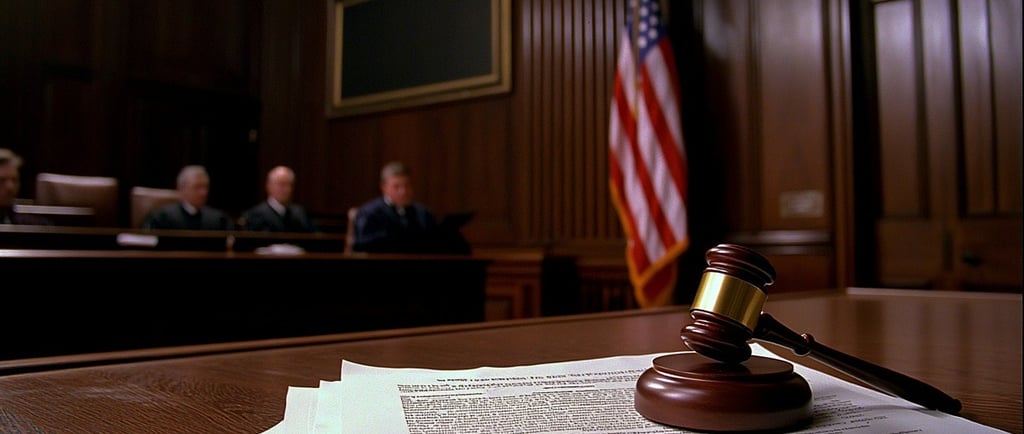Can a Voluntary Psychiatric Evaluation Strengthen Your Court Case in Maryland?
Think psychiatric evaluations are only for insanity pleas? Wrong! Discover how voluntary evaluations in Maryland criminal & DUI cases can influence fairness, leniency, and outcomes.
Mercy Nwankama, PMHNP-BC, MSN
9/17/20253 min read


Let's clarify something important, first.
Thank you!
You see, when people hear the words “psychiatric evaluation for court”, most assume it means someone is trying to “plead insanity” or prove they’re not competent to stand trial.
That couldn’t be further from the truth.
At the Joy of Life Clinic, we provide a very different type of psychiatric evaluation and court report: a voluntary one—one that's meant to support your case in court—not make it seem as if you want to run away from it.
What our voluntary psychiatric evaluations and court reports are not!
They are not court-ordered (a judge has not ordered you to do it).
They’re not for an insanity defense. Instead, they’re a way for defendants—especially those pleading guilty or no contest, or convicted in criminal cases or motor vehicle offenses—to present a fuller picture of themselves to the court.
It is not appropriate for those that know they have done wrong, and are not willing to own up to it and make tangible change.
It’s not about excuses. It’s about being seen as a whole person, not just a case number.
What is a voluntary psychiatric evaluation?
A voluntary psychiatric evaluation is a comprehensive assessment by a licensed mental health professional (available in Maryland only). Unlike court-ordered evaluations, this is initiated by the defendant and/or their attorney.
Think of it as a personal dossier: a structured, professional report that helps judges and attorneys understand the person behind the charges.
It can include:
A detailed personal and family history
A detailed mental health history
Insights into how stress, trauma, or mental health challenges may have shaped behavior
Signs of progress, responsibility, or readiness for treatment
Recommendations for rehabilitation and support.
Why does a voluntary evaluation matter in legal cases?
Courts are busy. Cases move fast. It’s easy for a defendant to become just another file on the docket. A voluntary psychiatric evaluation can change all that.
Here’s how it helps:
Clarity – Your mental health is presented in a structured, professional way.
Context – The court gains insight into your life experiences, not just the charges.
Credibility – Backed by a licensed psychiatric mental health professional with 20+ years of correctional experience, the report carries weight.
This kind of information helps the court see you as a full person—someone who can take responsibility, make changes, and benefit from rehabilitation rather than just punishment.
How does it impact criminal and motor vehicle cases?
Criminal charges: Judges may be more open to leniency, treatment programs, or alternatives to incarceration when they see evidence of responsibility and a willingness to address underlying issues.
Motor vehicle offenses (including DUI/DWI): Evaluations can demonstrate insight, responsibility, and a commitment to safe driving. They show the court that the defendant is addressing the root causes of risky behavior.
In both cases, the evaluation can tip the scales toward fairer, more balanced outcomes.
Who should consider a voluntary psychiatric evaluation?
This service is especially helpful for:
Defendants pleading guilty or no contest, or those who have been convicted and awaiting sentencing, who want to strengthen their plea for leniency.
Individuals with mental health challenges or substance use issues tied to their charges.
Anyone who wants to show the court they are more than their mistakes—and are ready to move forward responsibly.
The bottom line
A voluntary psychiatric evaluation is not about excuses. It’s about transparency, responsibility, and fairness.
By providing judges and attorneys with deeper insight into your story, you give yourself the best chance at a just outcome. You show that you’re serious about change—and that you deserve to be understood as a person, not just a case number.
Not a substitute for legal advice: The contents of this article are informational only, and should not be taken as legal advice. Our services are to evaluate and explain mental health factors that may affect your behavior, actions, and your case. Our reports are clinical in nature, not intended as legal advice. For legal guidance or representation, consult your attorney for expert advice.
What's next?
Read more details about our voluntary psychiatric evaluation and court reports for criminal offenses or motor vehicle cases.
Request a free initial case evaluation.

Home | About Us | Our Services | Blog | Terms & Conditions | Privacy | Telehealth | Forms & Resources | Appointments | Log In | Site Map | Contact Us
BY APPOINTMENT ONLY | NO WALK-IN
BEST WAY TO CONTACT US
Sign In to your account or Fill out the Contact Form or Appointment Form
or
Send us an Email at admin@jolclinic.com
Tel: (410) 231-3118 | Fax: (410) 262-6911
PATIENT RECORDS
To request your patient records, please sign in or go to the patient records information page.
Copyright © 2024 by the Joy of Life Clinic LLC.
4900 Belair Road
Baltimore MD 21206






